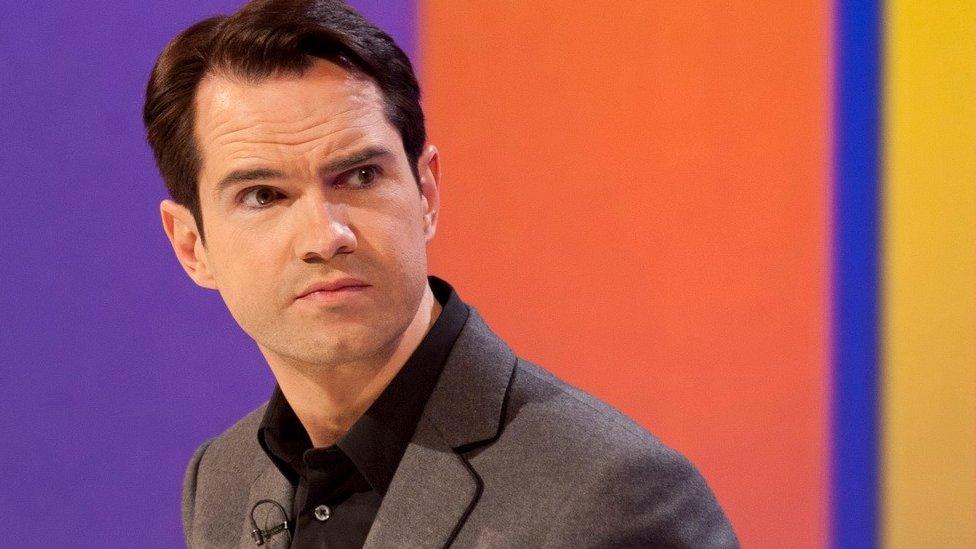Jimmy Carr: Comedy made my whole life better
- Published
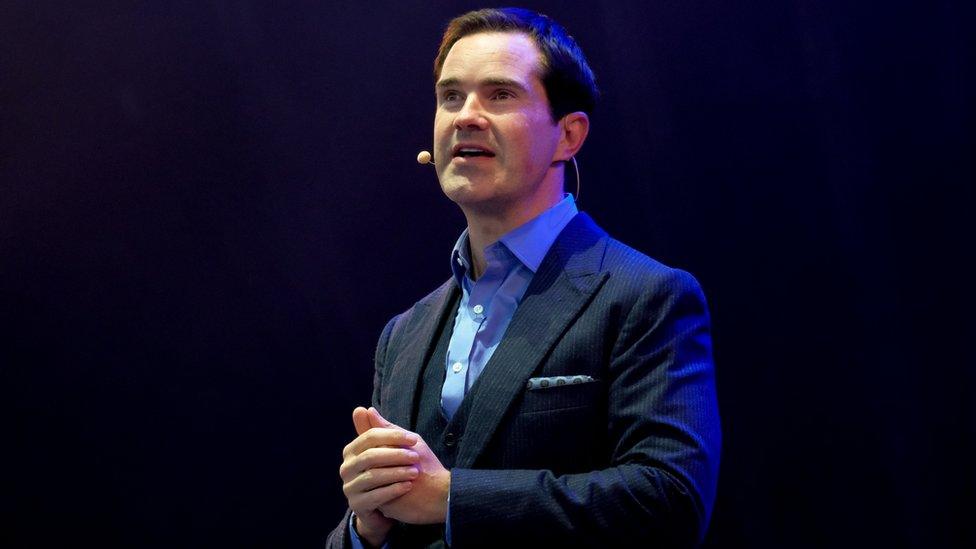
Carr says techniques he learned from comedy involving timing and communication improved all aspects of his life
Jimmy Carr might be one of the UK's best-loved comedians, but he is also well aware that many people will most remember him for the controversy surrounding his tax affairs almost a decade ago.
"If I wrote a biography and didn't mention the fact that I was publicly shamed with a tax scandal, I think readers would feel short-changed - much like HMRC did," he jokes to BBC News.
While his memoir Before & Laughter tackles a wide range of subjects and has no shortage of the witty one-liners he's known for, Carr also doesn't shy away from the aspects of his life which are harder to talk about.
The tax scandal is case in point. The 49-year-old hit the headlines in 2012 when he was found to have used a scheme which dramatically lowered the amount of tax he paid. It was legal, but a total PR disaster which prompted the then prime minister David Cameron to label Carr's actions as "morally wrong".
The comedian admitted to a "terrible error of judgement" at the time and paid the money back. Today, he reflects that the best approach is always to "handle your scandal" and talk about such things openly.
"If you're going to get cancelled, I'd recommend you get cancelled for impropriety with tax avoidance, because we cannot forgive what we cannot punish," he says. "It was very easy for me to say I was sorry and pay it back. And then it was done."
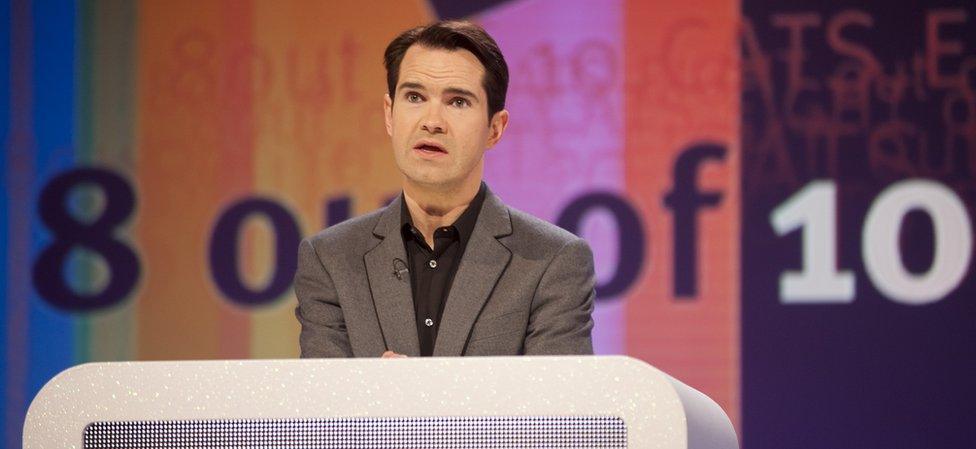
Carr was roasted for his tax controversy by his co-stars on 8 Out of 10 Cats
The tax affair did not end his career. Indeed, it provided him with some new material. Carr mined it for self-deprecating jokes and was generally praised for the way he handled the fallout - but only after being thoroughly roasted by his co-stars on the comedy show he was presenting.
"The thing that really helped was that I was doing 8 Out of 10 Cats at the time, a topical comedy show, and the thing that saved me was Sean Lock," he recalls, referring to one of the Channel 4 programme's team captains who died earlier this year.
"Sean was on the show, he saw me beforehand, checked I was OK, and then roasted me for half an hour. He just destroyed, and was really funny and really light, and I got my arse handed to me. Just great.
"That's what friends are for, going, 'Look, you messed up, this needs to be dealt with.' And then it's done, no judgement, no ill feeling. It is a terrible loss, having lost Sean, and I've been thinking about him a lot over the last couple of weeks and how special he was. I hate putting him in the past tense."
Before & Laughter captures Carr's personality and career well. He writes candidly about how badly his mother's death impacted him and his estrangement from his father. He also reflects on being a virgin until the age of 26, his famously distinctive laugh, and the work he's had done to improve his appearance.
But it also acts as something of a self-help book. The comic uses his own experiences as a springboard to encourage readers to get the most out of life.
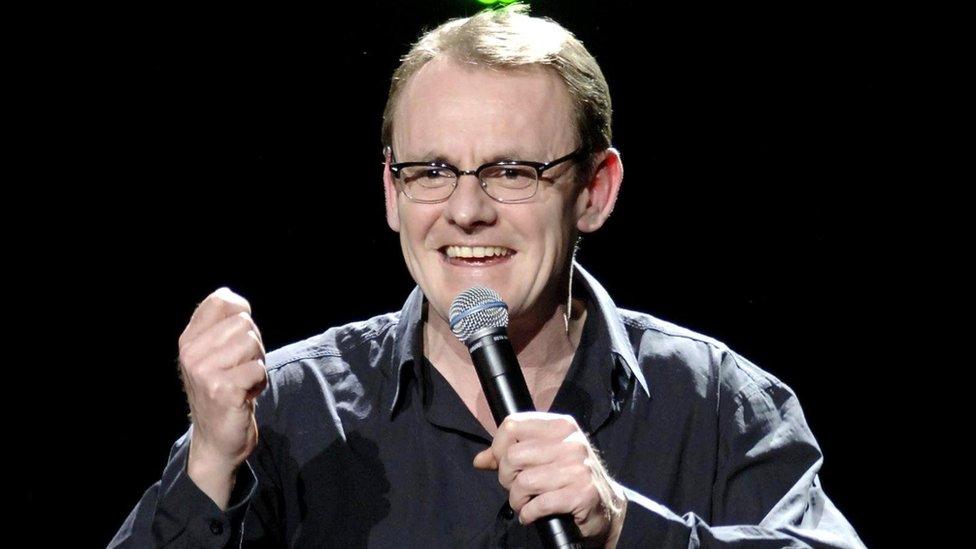
Carr says he hates talking about the late Sean Lock in the past tense
The Guardian's Tim Jonze said:, external "Initially I thought he might be spoofing the genre, but no: it's an utterly sincere guide for people to achieve bigger things in life.
"It's a strange read. At points it resorts to rather woolly clichés: seize the moment, save for the future, pretend to be happy and you may just become happy. For a man who once had a reputation as the dark prince of comedy, and whose jokes can be edgy, shocking and sometimes plain cruel, it seems very off-brand."
It is certainly out of character, but this approach has its own merits. The book is 90,000 words, longer than usual for a celebrity memoir targeted at the Christmas market, and his reflections and advice on life arguably give it more depth.
"Some people might be a little bit interested in me, but everyone is interested in themselves," Carr explains. "So I split the difference in the book. So it's half about me, and half about you."
There are certain things in the book which sound like jokes, but have a serious point lurking underneath them. "If you have imposter syndrome, chances are you're an imposter," he writes in one chapter. But he spins it into a positive, arguing feelings of inferiority "will make you push yourself to get better until you finally do belong".
He is hoping to advise and inspire others in the same way that previous books did him. "Self-help literature has really helped me," he says. "Things like NLP [neuro linguistic programming] and CBT [cognitive behavioural therapy] have really helped me in life, and I don't tend to share that a lot.
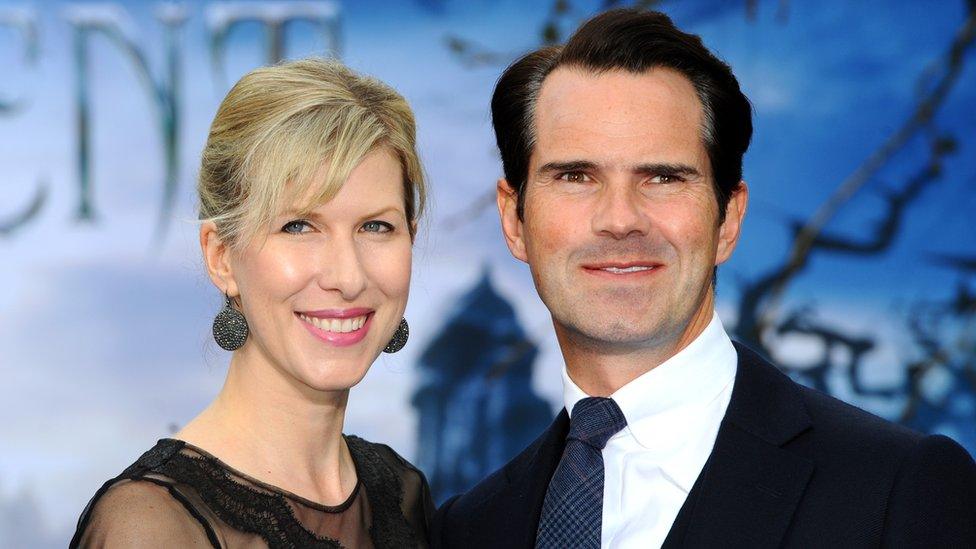
Carr and his partner Karoline Copping became parents for the first time two years ago
"Sometimes they're a bit earnest, and I'm not very earnest, I take life very lightly." But, he adds: "The lessons I learned from comedy made my life better - listening and communication, the rhythm of speech, and pattern recognition which is all joke writing is."
Carr writes at length in the book about how techniques gleaned from comedy improved his day-to-day existence. "Before you know it, [those skills] start to bleed into the rest of your life," he tells readers.
"Your relationships become better, because your communication skills are better. As your timing improves, not only do your laughs become louder in clubs, but you notice at a dinner party that you're never talking over anyone. You start to notice when you're in the pocket of a rhythm.
"All I was doing was trying to be a better comedian and I ended up having a better life. It taught me all the skills I needed, except for tax accounting."
'Comedy is a learnable skill'
Unusually for a celebrity promoting their memoir, Carr turns up for our interview without a PR officer in sight. He is self-assured and speaks freely. It is perhaps a reflection of the no-nonsense attitude which has so endeared him to both television and stand-up audiences.
Over the last two decades, Carr has become known for his dark sense of humour and relentlessly brutal one-liners. In the era of cancel culture, he remains one of the UK's most popular stand-ups - arguably because of his brand of humour rather than in spite of it.
"I get a lot of doctors, nurses, armed forces, first responders, coming to my shows," he notes. "And they often have a dark sense of humour, because they need it if they're doing those difficult jobs. There's a propensity for it, if you're dealing with that kind of stuff."
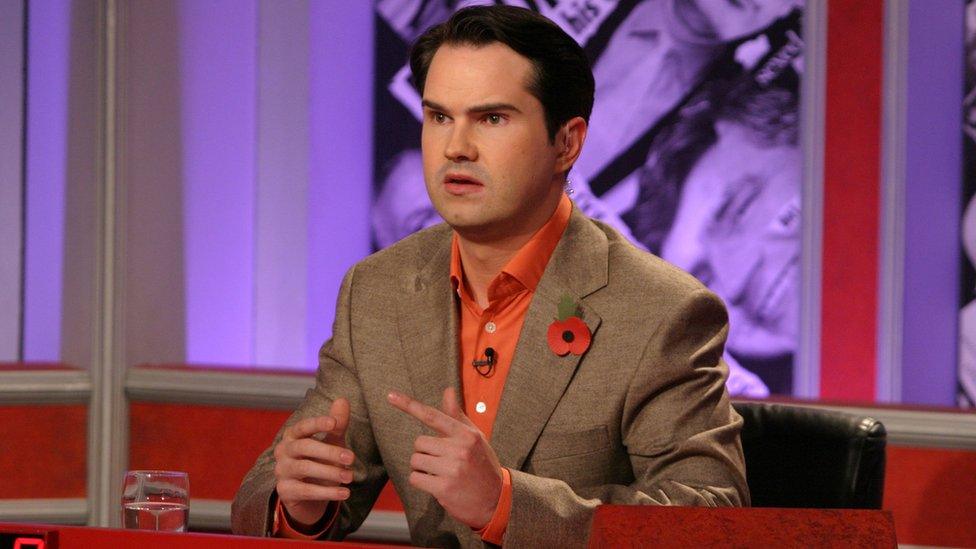
Carr shot to fame in the early noughties, becoming a favourite on comedy shows such as Have I Got News For You
But he didn't start out as a comedian. At the age of 25, Carr was working in the marketing department for oil giant Shell. Feeling unfulfilled, he had what he describes in the book as a quarter-life crisis, which prompted him to change careers.
He took a course in stand-up, graduated to performing five-minute slots at open mic nights and honed his craft at the Edinburgh Fringe, where he was nominated for the prestigious prize then known as the Perrier Award. Television work followed but stand-up was Carr's bread and butter, and he'd perform hundreds of sell-out shows every year.
Perhaps most interestingly, he thinks anybody is capable of becoming a comedian with enough determination. "I'm only basing that on fact," he says. "I was 25, I'd never written a joke. And now I'd be regarded as someone who knows their way around a joke. You can learn that skill."
His acknowledges his move from Shell was a significant gear change, but he stresses: "It's doable, I don't think there's anything special about me, I'm not brighter than anyone reading this interview.
"Do you do crosswords?" he asks. We say yes. "Well, at one stage you didn't. I bet the first one you did you were pretty rubbish, and by the 100th you were pretty good."
He rejects the suggestion that an inherently funny nature is required. "Everyone can learn these things. And increasing your capacity for laughter in life is no bad thing, whether you're a parent, you work in an office, or a garage, whatever you do, laughing and connecting with people is a big part of that."
Before & Laughter by Jimmy Carr is out now.
Related topics
- Published18 August 2021
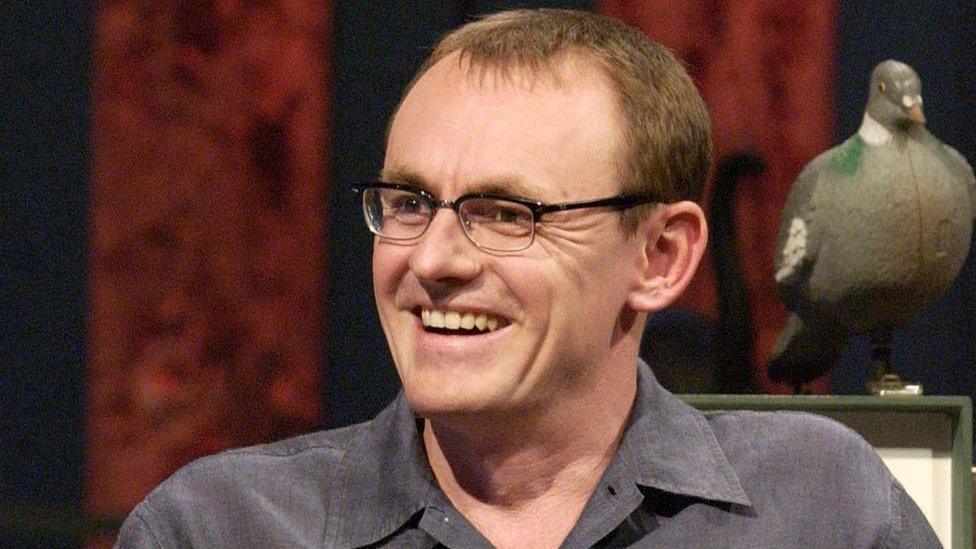
- Published5 March 2017
